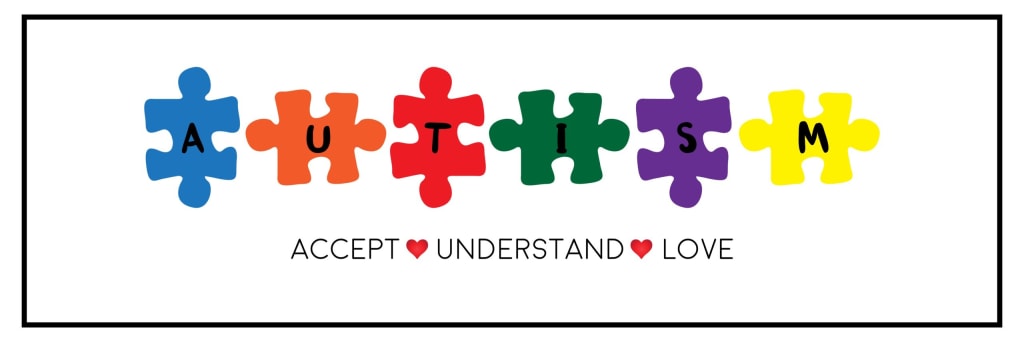
While many people have heard of Autism or Asperger's Syndrome, the things that usually come to mind are either very particular or just plain wrong.
For instance, without any sort of background knowledge, many people thing that Autism is more of the "lower functioning" folx, while those with Asperger's are considered "high functioning." While this used to be the case, it's actually now all classified as Autism Spectrum Disorder- otherwise known as ASD, or simply put, autism.
Why is that, you ask?
Well, like the name implies, autism is a spectrum. No two people are impacted by their autism in the same way, and their symptoms can vary in severity or prevalence from one person to the next. Also, the terms "high functioning" and "low functioning" are really insulting. All autistic people are impacted by their autism, so what you're really saying when you use these terms is how much their symptoms impact you. That's just not cool.
Now that we have that down, what exactly is ASD?
It's considered to be a developmental disorder, that typically impacts the way a person thinks and behaves, particularly in social, communication, or behavioral spheres, as well has how they process information or stimuli. The specific characteristics can range from minor to severe, where the individuals in question may need lots of assistance and care, or may even be considered 'gifted' and can succeed fully on their own.
The main takeaway from that is everyone is different. It's a spectrum for a reason, with a lot of the personality traits and potential symptoms to all come from a common place: how the brain functions.
Okay, so we know what autism is now. How can we know if someone is on the spectrum?
As a spectrum, there are dozens of symptoms that are common in ASD. If you've heard of some of the common symptoms or facts before, you may be familiar with more of the severe ones, such as:
-Hyper or Hypo sensitivity to different senses/stimuli (light, sound, taste, texture, touch, temperature)
-Lack of communication skills/Non-verbal or verbally limited
-Stimming/Self-stimulatory behavior (widely known examples: rocking back and forth, hitting/banging the head, hand flapping)
-Issues with relating to/connecting with others
-Avoidance of eye contact
-Trouble adapting to change, particularly with routine
-Special/Extreme interests

While these symptoms can definitely be a big bell ringing when trying to determine if someone is autistic, such as for diagnostic purposes or with a small child in order to begin the diagnosis process, this only works to a certain extent. The fact is, when autism was first discovered as a neurotypical divergence, the only people studied were young boys. This didn't even often include those who would previously be diagnosed with Asperger's- just the young boys who's symptoms severely impacted those around them.
This especially didn't include the female population, or take the potential differences of gender into account.
But wait, I thought girls couldn't be autistic?
Absolutely, girls, or people assigned female at birth, can be on the spectrum. The thing is, these symptoms often present differently in this population.
The reason why, is girls are often known to do something that boys are not: masking. This is an action wherein the individual appears to be functioning well as a neurotypical, particularly in the social sphere. In reality, they mask their own thoughts, feelings, or behaviors and instead mimic those around them. This mimicking isn't to mock or demean, however. What the person does is replicate the behaviors around them in order to appear like they fit in and belong there, like they are just like everyone else in this space. In reality, they're just hiding their true mannerisms and behaviors by putting up this metaphorical mask.
For the most part, people assigned male at birth either don't do this, or don't do it well enough to 'pass' the social test. For females, many would be ostracized by the surrounding society if they didn't.
They may be considered "shy" or "introverted," as they may not like being around a lot of people (due to potential over stimulation of the senses, as well as the difficulty in keeping up the mask and understanding social cues) or even speak up much the more people are included in the discussion. Their stimming may be muted or hard to discern, such as finger/foot tapping, being labeled fidgety, or even some internal things such as counting, listing off favorite things, or lip/cheek biting. They realize early on that the more noticeable stims are frowned upon or different, and therefore opt for these "socially silent" ones.
As for special interests, females definitely have them. Just, again, they're more socially acceptable ones, such as music, fashion, dolls, or animals. When a lot of other people in your demographic like the same thing as you do, the extent doesn't seem as strange. Therefore, it goes unnoticed.

If it goes unnoticed, do males and females get diagnosed at the same ages?
Typically, no. At least, not as of yet.
As a general whole, most boys considered to be roughly four times more likely to receive and ASD diagnosis than girls. This process can begin as early as 18 months old, with many boys getting their confirmation in early childhood. Of course, this isn't always the case, particularly with those who's symptoms aren't as noticeable or problematic for others.
However, as experts are now starting to look at how genetic makeup (particularly assigned gender at birth) impacts symptoms, they think the real ratio may be closer to 3:1, if not even more evenly matched. They're beginning to recognize how females present differently, and the rates of diagnosis can and will change as a result.
As of now, unless you're a female who presents very similarly to your male counterparts, you can expect a much later diagnosis- if at all. While many males can be diagnoses as early as 2 years old, it's very common that a female may not get the same diagnosis until their teens or even well into adulthood.
Sometimes, even if they go through the diagnosis process and actually are autistic, they may be brushed off or given other diagnoses, such as borderline personality disorder, attention deficit disorder, obsessive compulsive disorder, etc. While they may also have some of these other ailments, that doesn't mean they aren't also autistic.
Wait, you're telling me people can be autistic AND have other issues or mental health differences?
Absolutely they can. It's actually very common for people to have autism co-morbidly. Issues with understanding social cues or communication can cause anxiety. Trouble making friends, fitting in, or feeling like you belong can lead to depression. ASD and ADHD have a lot of common traits and symptoms, which also differ and present differently based by biological gender. Having trouble relating to others or seeing from their perspectives can lead to diagnosis of BPD or narcissism. Need for routine can present or even be linked with OCD, like needing to eat the same foods, take the same paths, have a strict schedule, or the like. People on the spectrum also often deal with various trauma in life, and can develop post-traumatic stress disorder as a result.
Being autistic doesn't mean you can't also be impacted by other things. That's like saying someone with diabetes can't also have high blood pressure or kidney disease, when in reality, the chances of having these co-morbid conditions are much higher than not. The correlation doesn't equal causation, but there is without a doubt a prevalence that neurotypicals need to be aware of.

That's interesting. Are there any other symptoms that may be indicative of ASD that maybe aren't as widely known or talked about?
Of course! The list of symptoms is extremely long and ever growing, especially as we discover how ASD impacts females differently than males. These include, but are far from limited to:
-Difficulty regulating emotions (often going from happy to angry, or emotions that can seem change at the drop of a hat- may lead to or include meltdowns)
-Inflections that don't reflect feelings/context (appearing happy when talking about something sad, sounding monotone about something exciting)
-May make involuntary noises, even in a quite place (such as clearing throat over and over, humming, etc)
-Take things very literally (issues with idiomatic statements, trouble understanding sarcasm or jokes)
-Extremely clumsy, always bumping into things, uncoordinated movements/motor skills, tripping over own feet/may even have a slightly weird gait or posture
-Difficulty with changing subjects or getting back to work after an interruption
-Sleep disturbances (insomnia, nightmares or night terrors, trouble staying asleep, vivid dreams, sleep paralysis)
-Aptitude for recognizing patterns or changes, with extreme attention to detail
-Poor short term memory (names, dates, appointments, tasks) but strong long term memory (conversations, specific information, events)
-Executive dysfunction
-Issues with object permanence or placement (may often forget something exists if its not in sight, easily lost or turned around if something changes or looking from a different direction)
Since a lot of these more "unknown" symptoms can often be chucked up to being peculiar, particular, clumsy, or even put in another co-morbid category, having these symptoms doesn't always make people think ASD. But, when you look at the autism community as a whole, these traits are overwhelmingly apparent and shouldn't be ignored, especially if there are dozens of these symptoms you can tick off as "Yes! That's me!"
Now, that's not to say that it means that you are for sure on the spectrum, but it could be something to look into if you think it may be pertinent.
I think I/my child may be on the spectrum. What should I do?

If you think that you or your child may be autistic, do some research. The information I supplied here is far from exhaustive. As a result, the more you look into it, you may resonate more with it or find that it may not be the best fit. As you do so, compile a list of the traits and things that make you think this may be the right route. This will make the actual diagnosis process much easier for you.
Now, if you do get to this point, start off by talking to your/your child's primary care physician or general practitioner. Your PCP may have resources for the ASD diagnosis teams and protocols in your area. Every country and state (US) has different regulations, many of which require you to have a referral from your GP or mental health professional, so speaking to your main doctor could kill two birds with one stone so to speak.
When you do have the appointment, as well as the actual diagnostic appointment, bring in the list of traits you compiled during your research. Having that list with you helps you not only remember everything you wanted to say and point out, but shows that you're serious and have viable reason to believe this may be a possibility. It also helps if you get easily flustered, or have trouble speaking/explaining things in high pressure situations, like a doctor's appointment/evaluation.
You may also decide that a diagnosis doesn't matter to you, or don't have access to the diagnostic process. That's okay too. If you want to reach out to other people on the spectrum, there are definitely places to do so. With the growing age of technology and internet, it's fairly easy to find an online group/community that is very welcoming to those who want to learn more about ASD, have someone in their life who is autistic, thinks they may be, or are clinically confirmed as being on spectrum.
At the end of the day, the choice of what you do from here is up to you.
___________________________________________________
*If you feel you learned a lot, or really enjoyed this content, give it a like or share!
Any and all likes, shares, or donations are much appreciated and help me grow and better myself. Thank you!!*
About the Creator
J. Lee
French enthusiast, non-binary trans person, artist, writer, lover of animals, space, and the right for every living thing to experience their existence authentically.
Pronouns: they/them (English) iel (French)






Comments
There are no comments for this story
Be the first to respond and start the conversation.